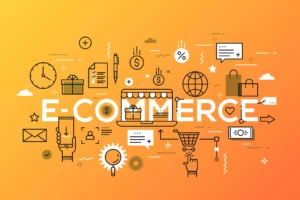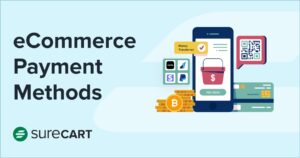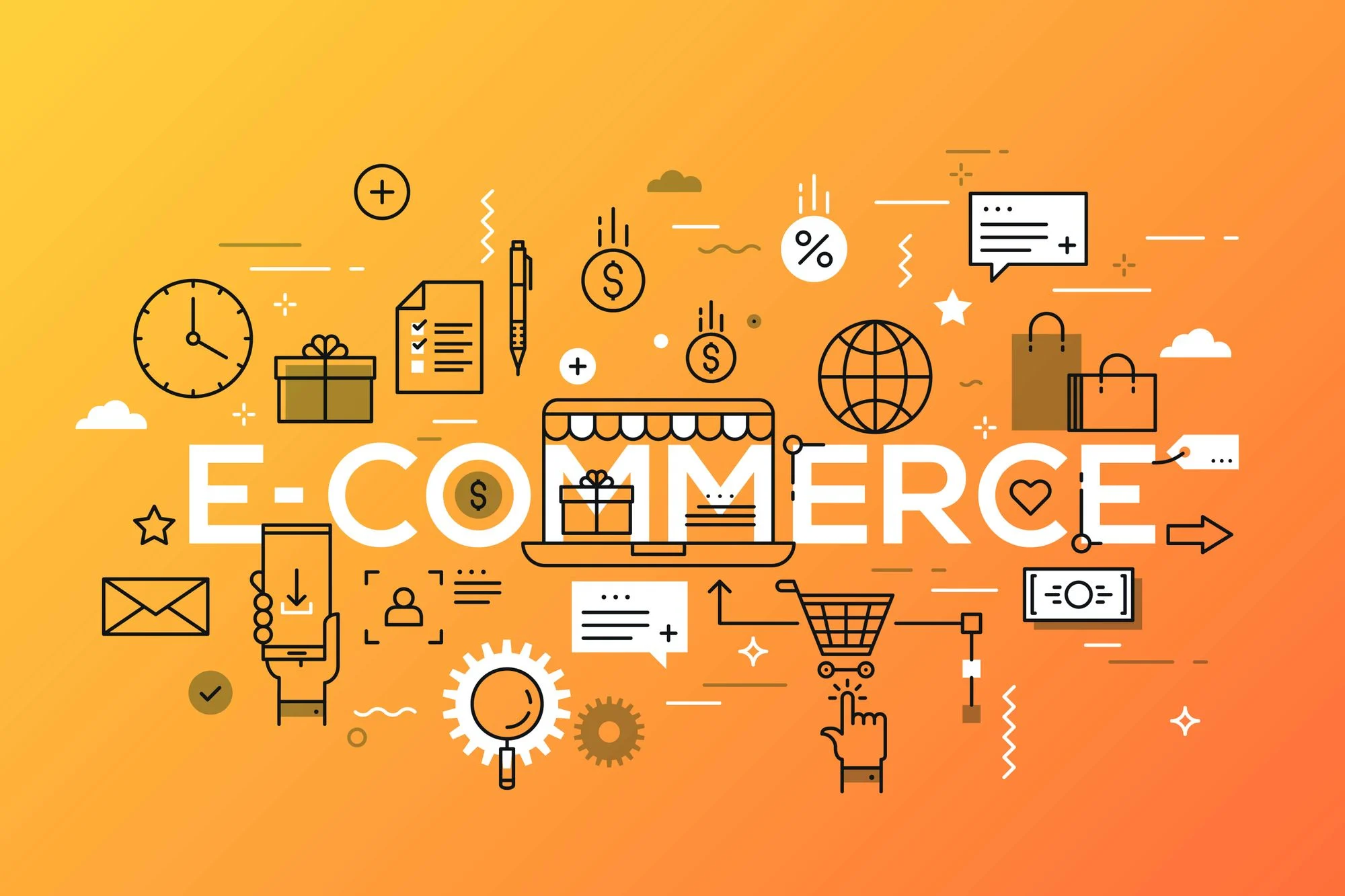E_COMMERCE Business in Pakistan

In Pakistan, E-commerce business means to sell and purchase goods and services on the internet. E-commerce industry in Pakistan: E-commerce has developed into a dynamic and rapidly expanding sector in Pakistan over the last few years, propelled by improved internet access, the increasing use of smartphones, and shifting consumer preferences. Digital Karma | E-commerce business in Pakistan This digital transition has opened up fresh opportunities for both new and seasoned retailers, giving them the ability to interact with a larger audience than ever without being confined to the boundaries of a traditional storefront.
What is an E-commerce Business?
-
A Comprehensive Guide on E-commerce business in Pakistan, Its Types, Benefits, Problems.
E-commerce business constitutes commercial transactions in Pakistan through online portals or websites, social media channels, and mobile applications. Types of E-commerce business in Pakistan These businesses operate in all formats like:
• Business to consumer (B2C): The most popular type of e-commerce, where businesses directly sell products or services to individual customers. Examples are large online mega stores such as Daraz and smaller websites dedicated to a specific set of products.
• Business-to-Business (B2B): Businesses sell to other businesses. That is, wholesale suppliers or manufacturers who sell mass items to retailers. tradekey and alibaba Pakistan are B2B sites.
• Consumer-to-Consumer (C2C): Products are sold by individuals to other individuals, generally made through classified ads or auction sites such as OLX and Facebook Marketplace.
• Consumer-to-Business (C2B): Consumers offer their goods and services to businesses. These include freelancing sites where individuals provide businesses with skill-based services, such as Upwork, Fiverr, and Freelancer content writing and graphic design
What Is the Working Method of E-commerce in Pakistan?

E_COMMERCE Business in Pakistan Then usually the Pakistan e-commerce businesses do these steps:
- Platform Setup: A business can set up an e-commerce website, establish a store on a marketplace (like Daraz), or utilize social media platforms (like Facebook and Instagram) to establish a presence. Some businesses use a combination to maximize their reach.
- This list shows how businesses can use social media to advertise their products. You may be wondering why accurate product listings are important?
- You put these marketing strategies, as well as social media marketing, Google ads, or any digital marketing strategies to generate traffic to your e-commerce business. Customers are drawn in with engaging content, promotions, and advertisements.
- Order Placement: Customers browse, add items to shopping cart and place order. They have multiple payment methods including but not limited to Cash on delivery (COD), bank transfer, and mobile wallets like jazzcash and easy paisa.
- Order Fulfillment: After a customer places an order, the seller processes and prepares the order for shipping. Based on the chosen implementation method (self-fulfillment or third-party logistics), the product is delivered to the customer.
- It is all about the Customer Service and After-sales Support now: Businesses have to manage customer inquiries, returns, and complaints to ensure customer satisfaction and build loyalty.
- Main Actors and Platforms in the Pakistani E-commerce SphereThere are a number of key players in Pakistan’s e-commerce industry, each serving different segments:
• Daraz: The biggest online marketplace in Pakistan that sells a variety of products like electronics, fashion, and groceries. Its well-advertised for its discounts, campaigns and speedy delivery via its logistics network.
• Yayvo by TCS: A trusted e-commerce site managed by one of Pakistan’s top logistics companies. It has a reputation for prompt deliveries and quality service.
• Homeshopping. There are several promexamples, includingBestDeals.
• Telemart: Popular electronic business with mobile phones and home appliances.
• OLX and Facebook Marketplace: Popular C2C platforms, generally used for buying and selling second-hand or new goods among individuals.
• Social Media Stores: A large share of e-commerce in Pakistan takes place through social media channels, where small businesses and entrepreneurs have diversified into sales of clothing, accessories, and cosmetics through Instagram, Facebook, and WhatsApp.
Payment Methods and Solutions

E_COMMERCE Business in Pakistan However, one of the most important things when it comes to e-commerce business in Pakistan is the payment method. E-commerce in Pakistan: Trust issues mean Cash on Delivery (COD) is still the most popular, but digital payment solutions are on the rise:• Cash on Delivery (COD) – Marketed by the most significant number of e-commerce customers, notably for valuable items or when getting new or obscure dealers.
• Bank Transfers & Credit/Debit Cards: Used primarily among tech-savvy consumers, spending on more established platforms.
• Mobile Wallets : JazzCash, EasyPaisa, UPaisa are the platforms enhancing digital Payment for the customer in more easy way to provide ease and secure digital payments.
• Online Payment Gateways: Local providers such as PayFast and SimSim enable integration with e-commerce websites, so merchants can collect payments directly from their online stores.
-
Advantages of Running an E-commerce Business in Pakistan
E-commerce Challenges Pakistan Score over other countries
• • Wider Reach: With e-commerce businesses are not bounded by distance and can reach customers across Pakistan plus worldwide.
• Lower Operational Expenses: Running online businesses usually cost less than running physical stores due to the absence of rent, utilities, and other overhead costs.
• Scalability — E-commerce platforms provide a scalable model to expand product range, manage more inventories and reacha broader customer base.
• Data &Insights: e-commerce business can gathered customer data and analytics and strategies to help them make informed decisions on product offerings, marketing, and customer experience improvements.
• Logistics and Supply Chain Issues: Delivery services have a tendency to sporadic delivery; this is especially around rural or remote areas of the country. Delays are common, and returns can be a hassle to facilitate.
• Trust and Security Issues: Many customers are not shopping online because they are afraid of fraud, counterfeit products, and low-quality products.
• Regulatory and Taxation Difficulties: Complex tax structures can pose significant difficulties for e-commerce businesses, especially in the absence of clear regulations.
• Digital Literacy: Most potential customers are still unaware of how e-commerce works which limits market penetration
What are e-commerce problems in Pakistan?
- • Logistics and Supply Chain Issues: Delivery services may not be reliable, especially in rural or remote areas. There are always delays, and returns can be a pain.• Trust and Security Issues: The fact that the e-commerce customers are suspicious about online shopping because they can be the victim of fraud, illegal products, and low-quality products.
• Challenges of Regulatory and Taxation: Not having clear regulations as well as complicated tax structures can be hard for e-commerce businesses to navigate.
• Digital Literacy: Most potential customers are not familiar with how e-commerce works, which may restrict the penetration of the market. E-commerce in Pakistan: A Forward Look
Moreover, the future of e-commerce in Pakistan holds bright prospects with government endeavors, advancements in technology, and evolving consumer habits. Pakistan e-commerce business The National e-Commerce Policy of the government is focused on doubling down on digital trade, boosting entrepreneurship and connecting e-commerce with mainstream economic activities.
• Growth of Digital Payment: The use of digital wallets and online bank services has been on the rise in India, leading to a decline in COD usage.
• Expanding E-commerce Scope in Rural Segment: Gradually Improving internet penetration and growing digital literacy in rural areas will amplify the e-commerce market beyond urban centres.
• Increase in Social Commerce: Social media platforms are being utilized more and more for purchasing and selling, presenting opportunities for small businesses to prosper.
Conclusion
Pakistan has a very thrilling time for E-commerce with opportunities encompassing towards innovation. Although challenges such as logistics and trust issues still persist, the sector is set for substantial growth, driven by technological innovations and enabling policies. Online presence and utilization of e-commerce platforms have become necessary tools for long-term success and profitability in the digital age for entrepreneurs and businesses. FAQS
What are the advantages of social media for e-commerce?
You could use social media channels for building brand awareness, including targeted ad campaigns, responding to customers in comments and messages, and working with influencers to help promote products.
What are the best practices for developing product listings?
Give them nice images, write a good product description that covers all areas of the product, cover specifications and dimensions, list customer reviews and also price and availability.
What are the key steps to starting an e-commerce business?
Starting an e-commerce business requires selecting a specific product or service area followed by market research and platform selection and store setup and payment integration and marketing strategy implementation and logistics and customer support setup.


How Can I apply
It is Suitable in Pakistan
article Opening Great
Amazing ways to earn money 💰
Nice 😊
Good for young generation 😀
It is suitable in Pakistan good job
👍👍👍👍
Nicee
dihxlwitzhrzvenkjeqxwwsnjxffhh